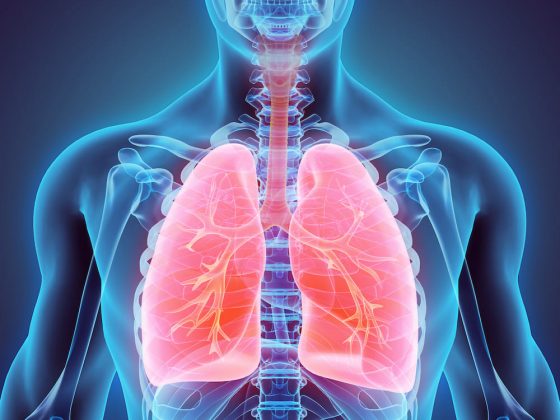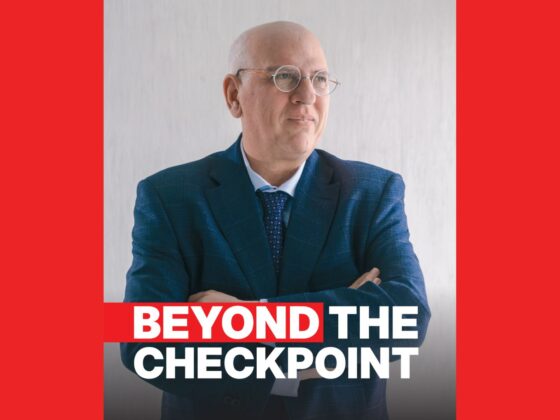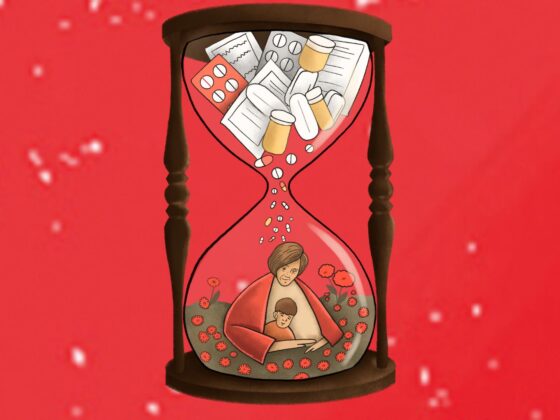Psychological stress is a known factor in numerous diseases from heart failure to auto-immune conditions. Evidence is now growing that implicates stress as a factor in cancer as well, with higher rates of recurrence and progression found in people experiencing higher levels of chronic stress. Researchers are starting to untangle the mechanisms at play, which are probably multiple and complex. For some clinicians, these new findings suggest that there needs to be a new frontier in treating cancer, which focuses on how patients can reduce stress levels during and after treatment.
“There are some naysayers in the field, but I think most people would be pretty much open [to it] now,” says cancer researcher Melanie Flint, who leads a stress and breast cancer programme at the University of Brighton, UK. “The evidence now is pretty compelling, particularly in preclinical models and in patient [populations], that high stress can lead to changes in the tumour, and particularly metastasis… we still don’t fully understand all of the mechanisms, but we’re pretty sure that it’s happening.”
Susan Lutgendorf from the University of Iowa, a specialist in psycho-oncology, agrees that multiple studies in ovarian, breast and prostate cancer now show stress is one factor in accelerating cancer progression. “The evidence for that is quite robust,” she says. These effects are linked not only to what we might clearly recognise as stress: “One of the strongest predictors of any biological mechanism in cancer that we’ve seen in our work in ovarian cancer has been social isolation – you could call it loneliness; people who say that they don’t have a strong sense of emotional support from another person. That seems to be very strongly related to tumour biology,” says Lutgendorf.
There is less evidence for a link between stress and the initiation of cancer. Currently that’s “a big stretch,” says cancer researcher Michela Perego from the Wistar Institute Cancer Center in Philadelphia, Pennsylvania. She suggests that stress should be seen less as a driver than “an important passenger”.
For Flint the jury is also still out on whether stress can cause cancer. Her review of current evidence doesn’t make a strong case, but she thinks that it could play a contributory role in certain contexts, “particularly if there’s a genetic mutation or an environmental factor going on, or it could be a virus as well.” Her team, together with the UK Institute of Cancer Research, is currently looking at data for patients with BRCA mutations. Their as yet unpublished findings give compelling evidence that, in these circumstances, stress may play a role in initiating cancer. “More work is needed,” she says, but as she points out, the potential role in cancer initiation is a more difficult question to study, as it requires data on stress levels from very large numbers of patients covering the period prior to any diagnosis.
The mechanisms linking stress to cancer
Physiological stress occurs when a physical or psychological stimulus causes the release of stress hormones which include glucocorticoids, such as cortisol, and catecholamines, such as epinephrine and norepinephrine. These bind to receptors on cell surfaces to activate complex downstream signalling pathways. Stress responses can allow us to deal with short-term dangers by increasing the heart rate and pumping more sugar to the muscles – often known as the ‘fight or flight response’. “A little bit of stress is good, so if you’re late for your train or late for an interview, you’re going to get activated to run faster to that train… however, it’s chronic stress that is the problem,” says Flint. “For a cancer patient, the very activities of cancer treatment, cancer diagnosis, the uncertainty, fear of recurrence, all these kinds of things are chronic stressors that are really hard to get away from,” says Lutgendorf.
The link to hormones had led to some assumptions that the effect of stress would be most pronounced for hormone-dependent cancers such as breast or ovarian, but Lutgendorf says more evidence is coming to light for cancers such as colon, haematological malignancies and melanoma, so it may turn out to be universal. “Not all cancers have been studied in this way,” she says.
The hormone cortisol induces high levels of reactive oxygen and nitrogen species, which lead to DNA damage, and ultimately metastatic spread
How stress hormones cause cancer regrowth is still not clear, but there are a number of suggestions. Lutgendorf says stress hormones both down-regulate the defences of the cellular immune system, through down-regulating T cells and natural killer cells, and also up-regulate tumour growth itself.
Flint has been looking at the link to DNA damage, which is a known cause of cancer. In a 2019 study of breast cancer cells and a mouse breast cancer model she showed that the hormone cortisol induces high levels of reactive oxygen and nitrogen species, which lead to DNA damage, and ultimately metastatic spread.
Flint’s work also suggests why stress may be a particular issue for those with BRCA mutations, which are heavily implicated in breast cancer susceptibility. The BRCA1 gene is usually able to suppress tumour formation by activating antioxidants to wipe up reactive oxygen species, but those with mutations will have even less ability to prevent the DNA damage caused by the reactive species cortisol induces. “If you’ve got some DNA damage that’s not all repaired, or there’s something else, like a mutation, and you don’t get the repair, then that could cause genome instability, which is one of the things that can lead to cancer,” she explains.
“What we still need to understand is how much [cortisol] is a chronic dose,” says Flint. Plus, it’s not just a matter of looking at the impact on cancer cells, she says, it’s important to also look at other cell types, particularly the impact on immune cells, which are a big part of the machinery that fights cancer.
Perego has been studying another mechanism, which may link stress hormones to the reawakening of dormant cancer cells after seemingly successful treatment of primary tumours, which is one of the major causes of mortality in cancer patients. As a staff scientist in the Wistar lab of Dmitry Gabrilovich, she didn’t start out studying the link between cancer and stress, but was interested in what causes dormant cancer cells to become reactivated. She created dormant cancer cells from genetically engineering lung cancer cells, or by treating lung, ovarian and breast cancer cells with a common chemotherapy drug. She then looked at what factors would cause the dormant cells to awaken when transplanted into mice.
First, she noticed that neutrophils – a type of white blood cell – could activate dormant tumour cells, but a part of the mechanism was missing. “We conducted many experiments that failed,” says Perego, “So we thought about [what was] systemic in the body that your cells feel.” She then exposed neutrophils to the stress hormone and neurotransmitter norepinephrine and found that, in these circumstances, they could reawaken dormant cancer cells.
Perego then confirmed this result in vivo. A study of 80 lung cancer patients also found higher recurrence rates post-surgery among patients whose blood had higher levels of a biomarker for norepinephrine and activated neutrophils.
Further investigation, in collaboration with researchers at the University of Pittsburgh, showed that norepinephrine sets off a chain of events that caused the neutrophils to rapidly produce proteins, which in turn stimulate the secretion of a type of lipid that had the ability to awaken the dormant cells. Such lipids are normally there, says Perego, but the presence of stress hormones leads them to be oxidised, and they are then able to up-regulate other growth factors that ultimately cause dormant tumour cells to awaken. While her work focused on the hormone norepinephrine, she says they did see similar effects with other stress hormones.
Sure enough, these drugs were able to prevent cancer recurrence in mice subjected to standard chronic stress models
To test this hypothesis further, Perego decided to see whether the pathway could be chemically blocked. Beta-blockers are currently used to treat cardiac diseases by blocking the action of stress hormones, so she decided to test their effect. In separate studies, she also tested an experimental myeloma cancer drug, tasquinimod, which blocks the production of the proteins responsible for the lipid activation. Sure enough, these drugs were able to prevent cancer recurrence in mice subjected to standard chronic stress models.
The use of beta-blockers to prevent cancer recurrence was also highlighted in a 2022 study led by Shamgar ben-Eliyahu at Tel Aviv University in Israel. Ben Eliyahu, who specialises in peri-operative treatment of cancer patients and psycho-neuro-immunology, analysed post-surgical outcomes for 34 colon cancer patients. In a randomised trial, half of the patients were given the beta-blocker propanolol and the COX-2 inhibitor, etodolac – an anti-inflammatory drug used for people with rheumatoid arthritis – 5 days before and 20 days after surgery. After five years, only 12.5% of the surgical patients who received drugs developed metastases, compared to 50% of those who had not.
Other studies have supported the protective use of beta-blockers. A meta-analysis of 13 studies comparing outcomes of patients with early-stage breast cancer according to beta-blocker use indicated use of beta-blockers was associated with a longer recurrence-free survival, particularly in people with triple-negative disease.
The evidence to date is not entirely consistent, however. A 2021 meta-analysis for ovarian cancer did not find clear relationships between beta-blocker use and ovarian cancer mortality, though the authors did conclude that the data presented limitations – for example they did not know what type of beta-blockers were being used. Perego agrees that these retrospective correlative population studies don’t always give the full picture.
Implications for treatment
Whether beta-blockers should now be prescribed to cancer patients to try to reduce stress-damage is still an open question. “Physicians have very conservative standards, and they will want to see a phase III study, which would be a multisite, adequately powered clinical trial, to be able to start prescribing beta-blockers, but I definitely think there’s enough evidence available that somebody should be doing such a trial,” says Lutgendorf. But given beta-blockers are off-patent, and therefore no drug company stands to benefit, this is unlikely to be forthcoming.
While stress is clearly a factor, it would be dangerous to assume that any medication designed to reduce stress will be helpful in reducing cancer mortality. In fact, a 2023 study from a team led by Michael Feigin, at the Roswell Park Comprehensive Cancer Center in Buffalo, New York, showed that, of the 40% of their pancreatic cancer patients who were prescribed some sort of anxiety medicine, those taking lorazepam had worse outcomes compared to those taking no anti-anxiety medication. This was in contrast to patients taking a similar benzodiazepine drug, alprazolam (Xanax), who had significantly longer progression free survival. The same patterns were seen for prostate, ovarian, head and neck, uterine, colon, melanoma and breast cancer, with lorazepam associated with a 25–116% increase in risk. Feigin has suggested this could be because the drug increases the expression of pro-inflammatory signalling chemicals that ultimately lead to tumour growth.
Lutgendorf has been looking at non-pharmaceutical interventions that could reduce stress and positively impact cancer survival rates: “Things like stress management, relaxation, and meditation and learning coping skills are really useful, because they down-regulate the stress response. And when you have stress, you’re able to step back a little bit, so your [physiological stress] response doesn’t spike as high.”
Evidence for the impact of these interventions is still ‘a controversial topic’, she says, but it is starting to appear. Health psychologist Julienne Bower, from UCLA, Los Angeles, carried out a randomised, multi-institution, three-arm trial, and found behavioural interventions could reduce symptoms in younger breast cancer survivors with elevated levels of depression. She looked at mindful awareness practices, which involve meditation and learning to focus on the present moment, and survivorship education, which includes surveillance for recurrence, management of long-term effects, and psychosocial well-being.
Stress markers were lower in those having gone through the training, and those who showed markers of stress had shorter than average disease free survival
Mike Antoni at the University of Miami has also looked at the effects of cognitive behavioural stress management on tumour-related biomarkers in breast cancer. Cognitive behavioural stress management is a group-based psychosocial intervention designed to change thinking and behaviour. His 2016 study of 51 women followed up for 11 years after a 10-week course looked at how this altered gene expression characteristics that are markers for stress. They found that, in the initial year, these markers were lower in those having gone through the training, and that those who showed markers of stress had shorter than average disease free survival.
Lutgendorf has just launched a web-based intervention programme ‘to improve quality of life in rural and urban ovarian cancer survivors,’ called Living WELL, which will teach participants mindfulness, stress management, and coping skills. Importantly, participants will be organised into small groups of between five and eight, with the idea that they will be able to provide each other with social support.
The effectiveness of this intervention is being assessed through a clinical trial that will measure its impact on participants’ health-related quality of life and on their perceived stress and depressive mood. The trial will randomise participants between this intervention – the Mindful Living arm – and a more traditional health promotion intervention – the Healthy Lifestyles arm – who will receive information on topics such as exercise, stress, nutrition, sleep, and chemo brain.
Lutgendorf hopes the trial will provide additional evidence for the importance of psychological support. She says currently clinicians don’t always have the time or inclination to find out whether patients are experiencing the kinds of chronic stress that might impact their long term prognosis. “The kind of classical questions that we ask patients to determine if they’re depressed, which is, ‘Have you been depressed, most of the day, nearly all of the day, for the past two weeks?’, doesn’t get at the complexity and the richness of the kinds of things people are experiencing,” she says. “The important lesson is for healthcare providers to be sensitive to the larger environment that their patient is in.”
Lutgendorf is aware of the risk that, for some patients, the idea that stress could be linked to worse outcomes can feel like ‘victim blaming,’ and says she has been accused of “[making] it feel like cancer patients are responsible for their disease or their disease progression”. This is of course not her intention, but as she points out, “If you flip it around, if we know that there are things that a person can do to lower their levels of stress, to increase their coping [mechanisms], increase their social support and prioritise the things and people that are important to them, [it will] increase their sense of empowerment.”
This article was amended on 9 October 2023 to correct a mistake regarding the location of the Wistar Institute Cancer Center












